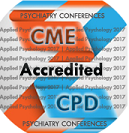
Hirokazu Osada
Senshu University, Japan
Title: Mental health literacy of neurodevelopmental disorders in Japanese general populations
Biography
Biography: Hirokazu Osada
Abstract
Statement of the Problem: According to a nationwide school survey (elementary and junior high schools) by MEXT (the Japanese Ministry of Education, Culture, Sports, Science and Technology) in 2012, homeroom teachers reported that 6.5% of pupils in regular classes might have neurodevelopmental disorders (i.e. Autism Spectrum Disorder; ASD, Attention-Deficit/Hyperactivity Disorder; ADHD, and/or Specific Learning Disorder; SLD). As students being older, the rates gradually lessened. About 38.6% of them, who were regarded as having neurodevelopmental disorders by homeroom teachers, didn’t have any special supports. 18.4% of the students were recognized as children with special needs; however, 6% of them remained free from any appropriate help. MEXT concluded that all school teachers MUST take training workshops related to neurodevelopmental disorders as soon as possible. 
Recent Research: I conducted the first nationwide epidemiological study among teachers, asking about ASD. While MEXT’s survey ask only homeroom teachers, I asked all kinds of teachers (i.e. principal, vice principal, regular class teacher, resource room teacher, special support class teacher, school nurse, and school counselor). To clarify Japanese elementary school teachers’ knowledge of ASD, comparing their knowledge with health care professionals’ knowledge and attitudes of Pakistan. I conducted a simple random sampling and chose 2000 elementary schools from all over Japan. 345 schools (collection rate: 17.25%), total of 1663 participants anonymously responded the questionnaires. To collect demographic data, we asked age, gender, attribution (regular class teacher, resource room, special needs class, school nurse, or other), teaching experience (years), and experience with ASD (Y/N); Asking about the diagnostic criteria of ASD, consisting of 10 characteristic behaviors for diagnosis; General beliefs about ASD, consisting of 22 statements, most of which were common misconceptions about ASD. I would like to present findings of my resent research in my keynote speech.
Conclusion & Significance: Japanese Teachers are certainly endeavoring to improve their knowledge and attitudes to students with ASD. What we need is nationwide increase of “Mental Health Literacy of ASD.” In Japan, although there are NPOs (or NGOs) or other organizations, which support children with ASD and their family, they don’t have strong impact to “Japanese general populations.” For instance, “Autism Speaks” can be one of the best models. I dare to say as my personal “delusion dream,” if “Autism Speaks Japan” were established in Japan, mental literacy of ASD would dramatically increase among Japanese general populations. For the sake of it, not only researchers, related mental health professionals, and/or advocates but also policy makers should try to approach stakeholders to establish more powerful organizations to support and empower children with ASD and their family for brilliant future in Japan.

